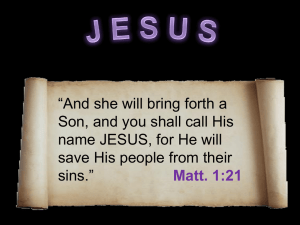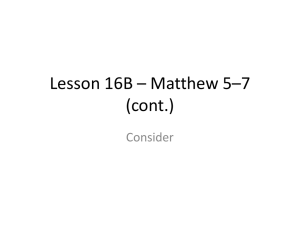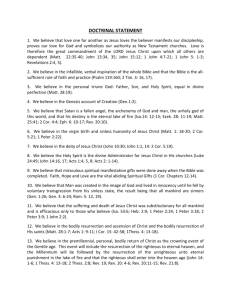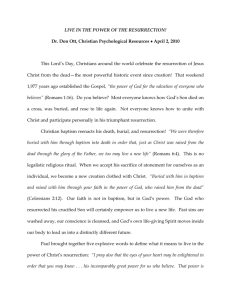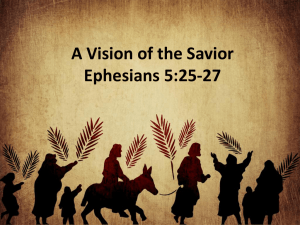Last Things - Harbour City Church
advertisement
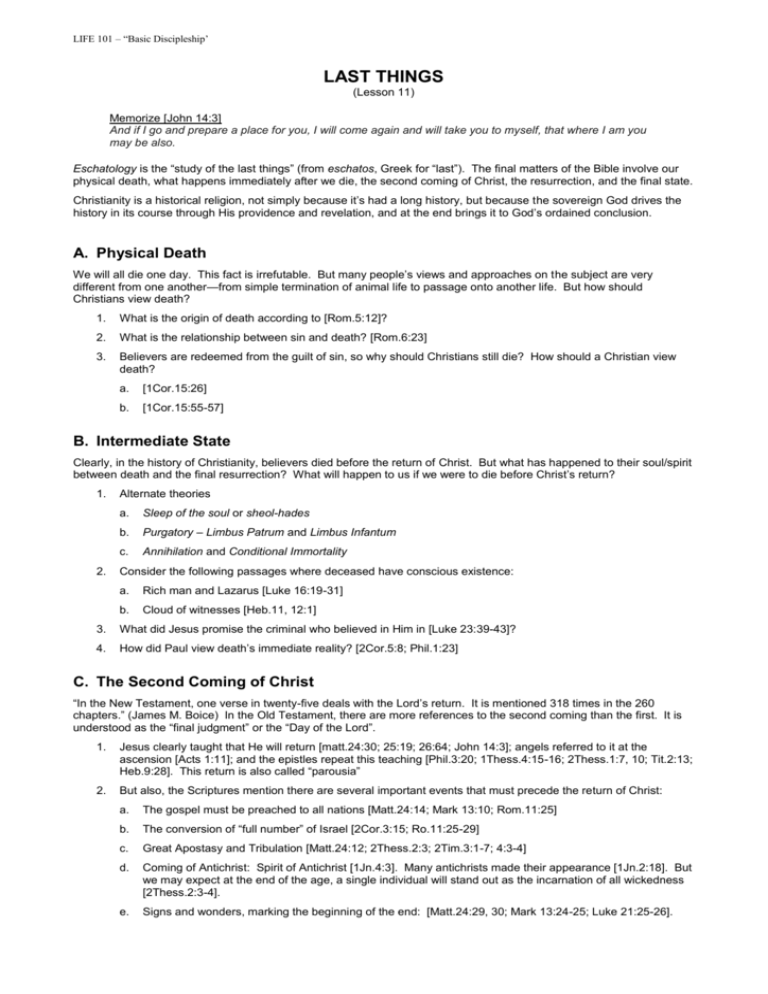
LIFE 101 – “Basic Discipleship’ LAST THINGS (Lesson 11) Memorize [John 14:3] And if I go and prepare a place for you, I will come again and will take you to myself, that where I am you may be also. Eschatology is the “study of the last things” (from eschatos, Greek for “last”). The final matters of the Bible involve our physical death, what happens immediately after we die, the second coming of Christ, the resurrection, and the final state. Christianity is a historical religion, not simply because it’s had a long history, but because the sovereign God drives the history in its course through His providence and revelation, and at the end brings it to God’s ordained conclusion. A. Physical Death We will all die one day. This fact is irrefutable. But many people’s views and approaches on the subject are very different from one another—from simple termination of animal life to passage onto another life. But how should Christians view death? 1. What is the origin of death according to [Rom.5:12]? 2. What is the relationship between sin and death? [Rom.6:23] 3. Believers are redeemed from the guilt of sin, so why should Christians still die? How should a Christian view death? a. [1Cor.15:26] b. [1Cor.15:55-57] B. Intermediate State Clearly, in the history of Christianity, believers died before the return of Christ. But what has happened to their soul/spirit between death and the final resurrection? What will happen to us if we were to die before Christ’s return? 1. 2. Alternate theories a. Sleep of the soul or sheol-hades b. Purgatory – Limbus Patrum and Limbus Infantum c. Annihilation and Conditional Immortality Consider the following passages where deceased have conscious existence: a. Rich man and Lazarus [Luke 16:19-31] b. Cloud of witnesses [Heb.11, 12:1] 3. What did Jesus promise the criminal who believed in Him in [Luke 23:39-43]? 4. How did Paul view death’s immediate reality? [2Cor.5:8; Phil.1:23] C. The Second Coming of Christ “In the New Testament, one verse in twenty-five deals with the Lord’s return. It is mentioned 318 times in the 260 chapters.” (James M. Boice) In the Old Testament, there are more references to the second coming than the first. It is understood as the “final judgment” or the “Day of the Lord”. 1. Jesus clearly taught that He will return [matt.24:30; 25:19; 26:64; John 14:3]; angels referred to it at the ascension [Acts 1:11]; and the epistles repeat this teaching [Phil.3:20; 1Thess.4:15-16; 2Thess.1:7, 10; Tit.2:13; Heb.9:28]. This return is also called “parousia” 2. But also, the Scriptures mention there are several important events that must precede the return of Christ: a. The gospel must be preached to all nations [Matt.24:14; Mark 13:10; Rom.11:25] b. The conversion of “full number” of Israel [2Cor.3:15; Ro.11:25-29] c. Great Apostasy and Tribulation [Matt.24:12; 2Thess.2:3; 2Tim.3:1-7; 4:3-4] d. Coming of Antichrist: Spirit of Antichrist [1Jn.4:3]. Many antichrists made their appearance [1Jn.2:18]. But we may expect at the end of the age, a single individual will stand out as the incarnation of all wickedness [2Thess.2:3-4]. e. Signs and wonders, marking the beginning of the end: [Matt.24:29, 30; Mark 13:24-25; Luke 21:25-26]. LIFE 101 – “Basic Discipleship’ 3. The nearness of Christ’s coming: [Heb.10:25; James 5:9; 1Pet.4:5] 4. Manner of coming: Surprise [Matt.24:26-44; 25:1-12; 1Thess.5:2-3; Rev.3:3. Visible [Matt.24:30; 26:64; Acts 1:11; Tit.2:13; Rev.1:7]. Glorious and triumphant [Matt.24:30; 2Thess.1:7, 10; 1Thess.3:13; 4:6]. 5. Dual purpose of His coming: Resurrection & Final Judgment [John 5:25-29; Acts 17:31; Rom.2:3-16; 2Cor.5:10; Phil.3:20-21; 1Thess.4:13-17; 2Pet.3:10-13; Rev.20:11-1; 22:12] D. Views on Millennium One of the major debates in Christianity has to do with the “timing” of when Christ will return. Clearly, He will return, and clearly, we will not know the day or the hour. But given certain “signs”, the debate revolves around the timing of the return in relation to those “sign posts,” namely, millennium. 1. Millennium (thousand years of Christ’s reign) is only mentioned in [Rev.20:1-6]. However, the question is how “literal” is the scripture’s intention? What other biblical passages are related to this idea? 2. Varying views on the theological timing of Christ’s return 3. a. Amillennialism b. Post-millennialism c. Historic Pre-millennialism d. Dispensational Pre-millennialism These views are not critical to salvation, and are not tests for orthodoxy. However, they do represent particular methods employed for general biblical interpretation. E. The Resurrection “Scripture teaches us that at the return of Christ the dead will be raised up. …It also teaches us to look forward to a bodily resurrection, similar to the resurrection of Christ. The redemption in Christ will include the body. …According to Scripture the general resurrection will coincide with the return of Christ and the end of the world, and will immediately precede the final judgment.” (Louise Berkhof) 1Cor.15 1. Old Testament: [Isa.26:19; Dan.12:2] 2. New Testament: [John 5:25-29; 6:39-44; 11:24-25; 1Cor.15; 1Thess.4:13-17; Re.20:13] 3. Bodily resurrection: [Rom.8:23; 1Vor.6:13-20] 4. Resurrection leads to the Final Judgment: [Ps.98:9; Eccle.3:17; Matt.25:31-46; 2Cor.5:10; Rev.20:11-14] F. The Final State 1. Hell (Louise Berkhof) “Some deny that hell is a place and regard it merely as a condition, but the Bible uses local terms right along. It speaks, for instance, of a “furnace of fire,” [Matt.13:42], a “lake of fire” [Rev.20:14, 15], and of a “prison,” [1Pet.3:19], all of which are local terms. In this place they will be totally deprived of the divine favor, will experience an endless disturbance of life, will suffer positive pains in body and soul, and will be subject to pangs of conscience, anguish, and despair. (However) there will be degrees in their punishment [Matt.11:22-24; Luke 12:47-48; 20:47]. It is evident that their punishment will be eternal.” 2. Heaven (Berkof) “the final state of believers will be preceded by the passing of the present world and the establishment of a new creation. This will not be an entirely new creation, but rather a renewal of the present creation [Ps.102:26-27; heb.12:26-28]. Heaven will be the eternal abode of believers. Some think of heaven merely as a condition, but the Bible clearly represents it as a place [Jn.14:2; Matt.22:12-13; 25:10-12]. The righteous will not only inherit heaven, but the entire new creation [Matt.5:45; Rev.21:1-3]. The reward of the righteous is described as eternal life, that is, not merely endless life, but life in all its fullness, without any of the imperfections and disturbances of the present. This fullness of life is enjoyed in communion with God, which is really the essence of eternal life [Rev.21:3]. While all will enjoy perfect bliss, there will be degrees also in the enjoyments of heaven [Dan.12:3; 2Cor.9:6].


